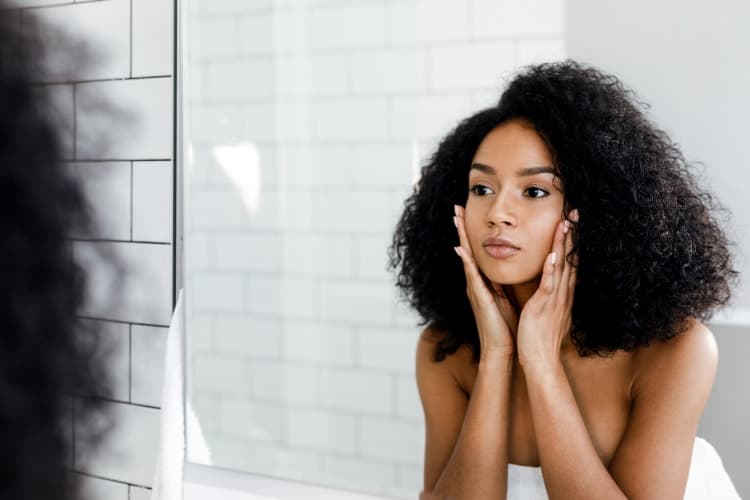
Whether your acne breakouts show up as small pimples or painful cysts, whether it’s just a few spots or it covers your entire face, this post is going to show you how to get rid of hormonal acne naturally…once and for all.
You see, at the most basic level, acne is a chronic inflammatory condition (source). So, with this basic definition in mind, how do you go about eliminating hormonal acne?
The best way to stop hormonal acne naturally is to take a holistic approach that involves diet, lifestyle and a balanced skin care routine. Even though it’s tempting to focus just on one’s skin care routine, making a few, strategic food and lifestyle tweaks allows you to address the underlying inflammation.
Now, to help you get started, here’s what we’re going to cover in this article:
- The main factors that trigger acne.
- How to know if your acne is hormone-related.
- The 7-step holistic plan that you can use to clear up your skin.
Note: this post contains affiliate links and I earn a commission (at no additional cost to you) if you use them to make a purchase.
THE MAIN FACTORS THAT TRIGGER HORMONAL PIMPLES
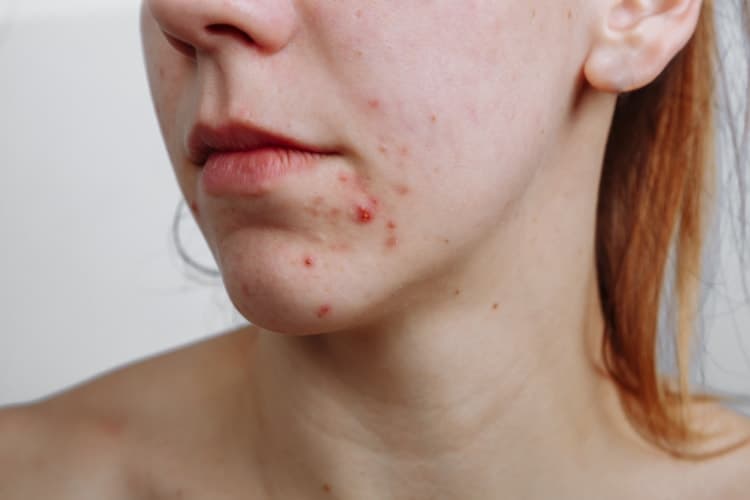
In order to address the inflammation that causes hormonal acne, we have to identify what triggers inflammation.
And it boils down to one thing: stress. But we’re not just talking about emotional stress here.
Overall there are three types of stress that we can face. These are emotional, chemical and physical stress.
Now, as far as the body is concerned, stress is stress.
This means all 3 forms of stress trigger the body’s stress response system, which is also part of our natural inflammatory response.
We’ll get into more of how that stress response correlates to acne, but first, let’s have a quick look at those 3 categories of stress.
1. EMOTIONAL STRESS
This is pretty self-explanatory and it includes things like anxiety, worry or a busy/overwhelming schedule.
2. CHEMICAL STRESS
These days chemical stress can be as bad as – or even worse than – emotional stress.
That’s because the most common source of chemical stress is the food we eat every single day.
Here are a few things in food that contribute to stress and inflammation:
- Unhealthy or processed ingredients (refined sugar, hydrogenated fats, and so on) as well as other pro-inflammatory foods like dairy and red meat.
- Pesticides (which can disrupt hormones) as well as other hormone disrupting-ingredients.
- Unnatural and pro-inflammatory additives, preservatives and colorants.
In addition to food, makeup and skin care products can contain ingredients that add more stress to the body.
Furthermore, there’s also water and air as potential sources of stress-inducing chemicals.
NOTE: the goal isn’t to live in a bubble and avoid everything. Rather, we want to focus on the stressors that you have the most control over. In this case, it’s the food-related stressors.
3. PHYSICAL STRESS
This can include things like a wound, an injured muscle or a misalignment in your spine (or other body parts).
How Stress Affects Hormonal Acne
No matter what type of stress we’re talking about, they all activate our stress response system aka HPA axis (hypothalamic pituitary adrenal axis).
There’s a lot that the HPA axis does, but for the sake of simplicity, we’re going to focus on just one aspect: the adrenals.
When we’re stressed, the adrenals release anti-inflammatory hormones, such as cortisol.
As cortisol increases a bunch of other processes are triggered. These processes can end up contributing to acne. Below is a brief overview of how that can happen.
1. Excess oil production
During stressful times, the adrenal glands stimulate the sebaceous glands to make more sebum.
This means more oil on your skin. Long term, this can worsen clogged pores, and make each pimple larger and more painful (source).
2. Gut Dysfunction
Blood flow to the gut is reduced when there’s a lot of stress.
Since blood carries nutrients, this means that chronic stress leads to chronically reduced blood flow to the gut.
And with less nutrients going to the gut, inflammatory conditions like leaky gut and gut dysbiosis (imbalance in your microbiome or gut bacteria) develop.
This is majorly important for acne because some studies show that people who struggle with acne have less diverse gut bacteria than people who don’t (source).
3. Hormonal imbalances
When we’re stressed, we need more glucose in the blood as a source of energy.
And interestingly, as cortisol increases, it prevents insulin from doing its job (so more glucose stays in the blood).
Unfortunately, this contributes to insulin resistance and in that insulin resistant state, the ovaries end up making more testosterone and less estrogen.
This increase in androgens triggers inflammation which leads to increased sebum production, clogged pores, added stress and so on.
So, as you can see, there’s really a vicious cycle that gets created when we’re dealing with hormonal acne.
And the best way to truly break free from that cycle is to lower inflammation.
NOTE: the mechanisms described above are very simplified. While one person’s trigger may differ from another, I simply want to highlight the fact that stress comes in different forms and it all contributes to inflammation conditions like acne.
HOW TO KNOW IF YOUR ACNE IS HORMONAL
In general, acne is considered to be hormone-related if it (source):
- Occurs on the lower part of the face, such as the chin and jawline.
- Flares up before your period, during menopause, during pregnancy or other phases of life when there’s a significant shift in hormones.
- Becomes worse as you go on or off hormone therapies (such as birth control).
In addition to the above, hormone-related conditions like PCOS can also cause acne to worsen.
This is mainly due to the fact that high androgens and insulin resistance are quite common in PCOS patients. And as we’ve seen, imbalances in both of those hormones contribute significantly to inflammation and hormonal acne.
NOTE: the tips in this section are general guidelines. The only way to know for sure if your acne is hormone-related to get your hormones tested by a doctor.
7 STEPS TO ELIMINATE HORMONAL ACNE NATURALLY AT HOME
In this section, we’re going to look at how to use your diet, lifestyle and skin care routine to start clearing up your skin quickly.
If your acne is really severe, it’s best to follow all of these steps.
However, you can start with whichever ones make the most sense for you and add on others as time goes by.
1. Add More Hormone Balancing Foods To Your Acne Diet
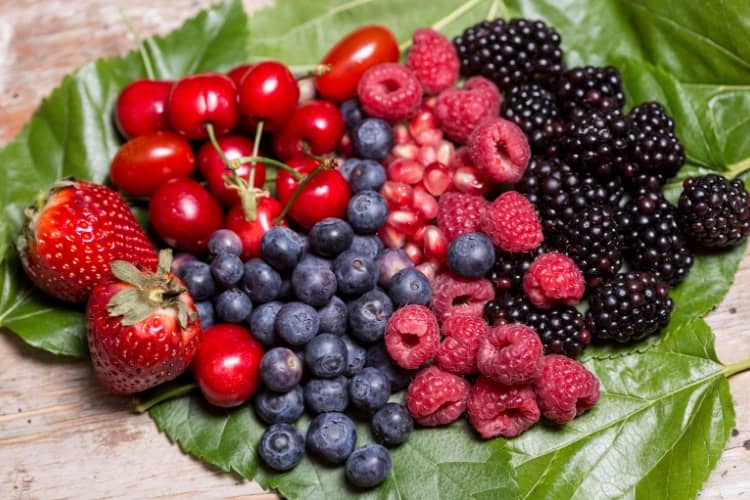
The most high impact step that you can take to clear up your skin is to eat more hormone-friendly foods.
There are 5 categories of hormone-balancing foods that I suggest focusing on:
- Cruciferous vegetables: they’re ideal for detoxing excess estrogen and therefore, supporting a healthy ratio of estrogen to progesterone. Remember that even if your body is making more androgens and less estrogen, your estrogen to progesterone ratio can still be off balance. Therefore you can still be in an estrogen dominant state that contributes to acne. Example of foods to eat are cauliflower, bok choy, radishes, broccoli, kale, collard greens and cabbage.
- Plant proteins: plant proteins are more nutrient-dense (i.e. have a wider diversity of nutrients) and more anti-inflammatory than animal proteins. Example of foods to eat are nuts, seeds, beans, quinoa and broccoli.
- Naturally fatty foods: fats are the raw material for all of our sex hormones as well as all the adrenal hormones. Example of foods to eat are avocados, coconuts, nuts, seeds, nut butters and olives.
- Antioxidant-rich fruits: antioxidants help fight off the damaging effects of inflammation at a cellular level. Example of foods to eat are oranges, blueberries, melons, papayas and mangoes.
- Green vegetables: they’re high in chlorophyll which supports detoxification. Example of foods to eat are cucumber, kale, spinach, broccoli, arugula, microgreens, dandelion greens.
To learn more about these foods and for more examples of which ones to eat read this post on the top 5 hormone balancing foods.
2. Consider Seed Cycling for Acne
Seed cycling is a food-based approach to hormone balance that is synchronized with your menstrual cycle.
With seed cycling you eat a specific set of seeds during each phase of your cycle. It looks like this:
- Follicular phase: flaxseeds and pumpkin seeds.
- Luteal phase: sesame seeds and sunflower seeds.
Each set of seeds provides nutrients that support how our hormones naturally fluctuate throughout the month.
Now, even though there’s not a lot of scientific research around seed cycling, it’s a method that is often taught to naturopathic doctors.
And there is anecdotal evidence from women on social media and other blogs who have successfully used seed cycling to improve their hormones and skin.
If you need help with this protocol, then be sure to read this beginner’s guide to seed cycling for hormone balance. It’s got all the details you need to get started.
3. Support Gut Health To Keep Acne Away
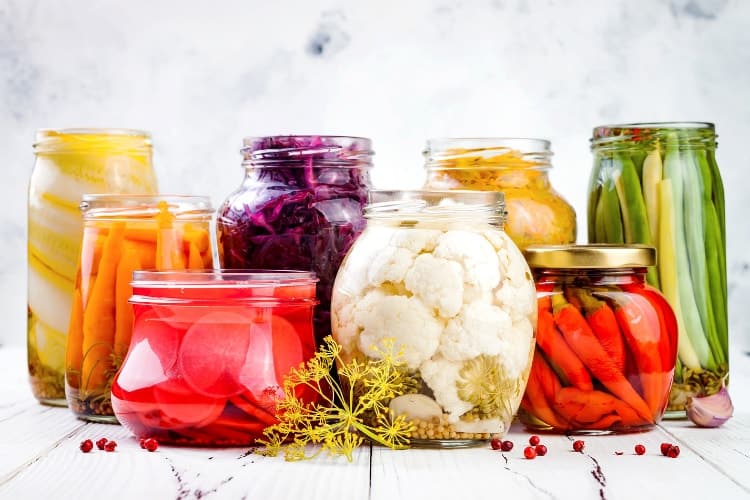
Not only is the skin our largest organ, but it’s also an elimination organ (which is why we sweat).
However, the skin isn’t for heavy duty elimination. That job is for your colon!
Therefore, it’s important to keep your colon healthy and to make sure that you have at least 1 bowel movement every single day.
The reason why this matters a lot for acne is because if you can’t get rid of that waste through the colon, your body can try to expel it through the skin.
And this will only worsen your acne.
So, make sure to eat plenty of gut-friendly foods.
Now, the good news is that the hormone-friendly foods we talked about earlier are also great for your gut 🙂
Having said that there are three gut-friendly foods I want to highlight here: bone broth (or veggie broth if you’re vegetarian/vegan), prebiotic-rich foods and probiotic foods.
- Broths are a concentrated source of nutrients that heal the gut lining.
- Probiotic foods (like fermented veggies) contain live bacteria that are beneficial for repopulating your gut bacteria.
Adding these two gut-friendly foods into your diet can give your skin a much-needed boost.
4. Support Healthy Liver Function
Before toxins can be eliminated from the body, they have to be filtered out of the blood.
And the liver is responsible for that job. It basically takes in blood from the digestive tract, filters it and then sends it out to the rest of the body.
So, maintaining a healthy liver makes it easier to get rid of any toxins that are contributing to inflammation.
Here are a two things you can do to help your liver function properly:
- Eat more anti-inflammatory foods (basically the same hormone-balancing foods we already talked about!).
- Add bitter foods to your diet because they are particularly healing and nourishing for the liver. Choose from things like green tea, endives, radishes, dandelion and kale.
5. Use Acne Supplements Wisely
The one thing that determines how well a supplement works is how much of it you actually absorb.
And that is totally dependent on the health of your gut and digestive system (including the liver). If these two things are not in good shape, you may not absorb much of the good stuff that it’s a supplement. And it can look like the supplement isn’t working.
So, before you go crazy with tons of supplements, make sure you’re taking care of your gut and liver as outlined above.
Once these two things are taken care of, then you want to consider taking a good daily multivitamin/multimineral supplement. My two favorites are Beyond Tangy Tangerine and Pure Synergy Multivitamin (learn about both in this guide to supplements for female hormonal imbalance).
In addition, other supplements that some women find helpful for acne are:
- Evening primrose oil.
- L-lysine.
- Fish oil.
- Zinc.
- Vitex.
- Vitamin C.
6. Prioritize Self Care To Lower Stress
It’s easy to underestimate the effects of emotional stress and a busy lifestyle on hormonal acne.
Yet, as we’ve seen in this article, our bodies react the same way to all stress.
So, making time for self care can be a fun and relaxing way for you to lower inflammation and support health skin.
Now, when it comes to self care, there’s no one-size-fits all.
What is relaxing and stress-relieving for one person can be boring and stress-inducing for another.
So, you might have to do a little experimenting to see what works for you.
However, here are some general tips to consider:
- Physical activities like yoga, dancing or hiking.
- Diffusing essential oils.
- Adult coloring books.
- Journaling.
- Cooking a favorite meal.
For more ideas, read this post on starting a self care routine for hormone imbalance.
7. Adopt a Simpler and More Natural Skin Care Routine
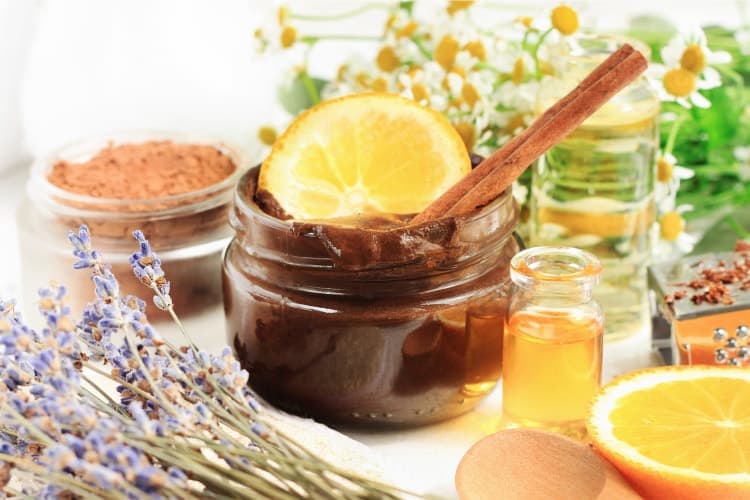
First, when creating a skin care routine for hormonal acne, look for products that are:
- Non-comedogenic i.e. doesn’t include ingredients that clog pores.
- As natural as possible. In particular, you want to avoid potential hormone disruptors or pro-inflammatory ingredients. This means watching out for ingredients like parabens, triclosan, phthalates, siloxanes, BHA and BHT.
Next, be careful not to over-clean your skin. Even though oily skin and clogged pores can lead to an overgrowth of bacteria, excessive cleansing – especially with harsh ingredients – can also destroy the healthy bacteria that naturally sits on the skin.
As with most things in life, less is usually better.
Lastly, consider using a nourishing face oil like jojoba (or rosehip oil) as your daily moisturizer.
Now, you might think this would make your acne worse, but…jojoba oil is the only oil that is closest to the natural sebum that our skin produces.
And research suggests that applying jojoba oil on the skin actually signals to your body that it doesn’t need to produce more sebum (source).
In addition, jojoba oil is non-comedogenic so your pores can actually breathe!
FAQs FOR HOW TO GET RID OF HORMONAL ACNE NATURALLY
Does drinking water help acne?
Water helps to flush out waste from the body. Therefore, it can help with eliminating toxins that are clogging your pores and contributing to inflammation.
CONCLUSION: DOES HORMONAL ACNE EVER GO AWAY?
Overall, acne is an external inflammatory condition that is a reflection of the internal inflammation that the body is experiencing.
So once you start changing the conditions that create internal inflammation, your skin will also start clearing up.
And the quickest way to start seeing results is to eat more foods that support your hormones, gut and liver.
As you make dietary changes, you can also start incorporating self care practices into your life, as well as simplifying your skin care routine.
With this holistic approach you can get healthier skin that you can enjoy for decades to come!
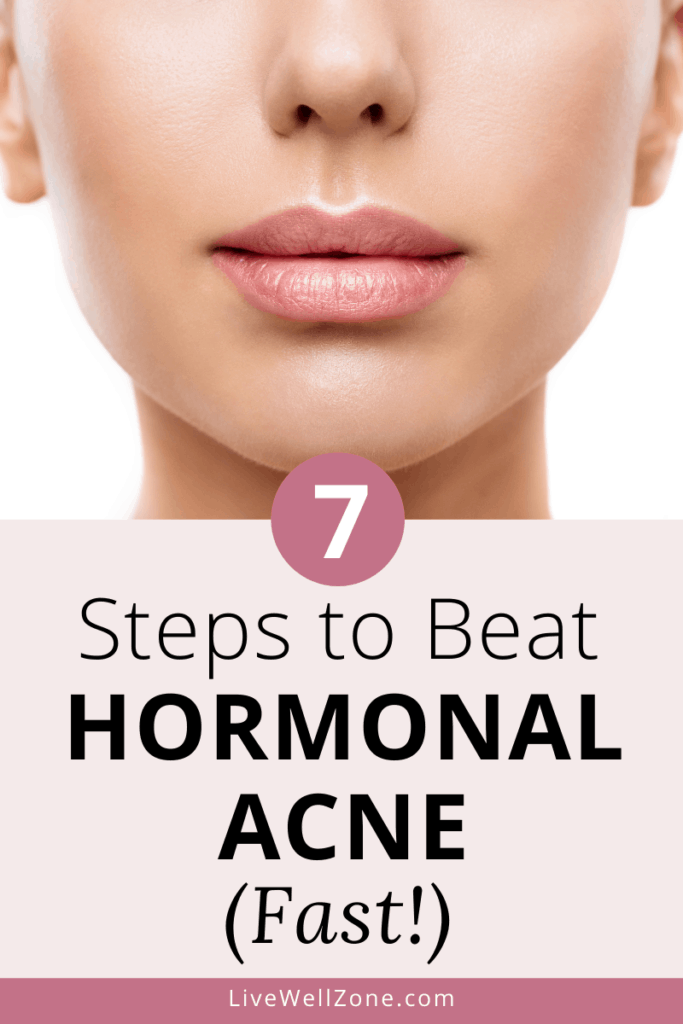
You Might Also Like:
A Comparative Guide to Green Tea vs Spearmint Tea for Acne
Adaptogens for Hormonal Acne: What To Use and How To Use
9 Teas for Acne-Prone Skin (for internal and topical use)
Home Remedies for Hormonal Acne (Every Woman Should Know!)
Gut Health and Hormones: A Complete Guide for Happy Hormones
3 Supplements For Female Hormonal Imbalance (you probably don’t know about)

